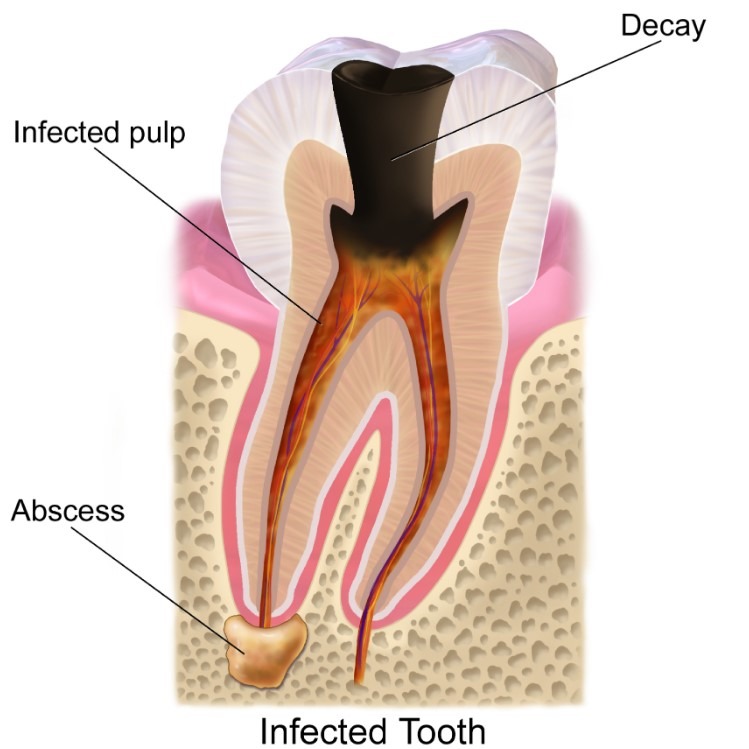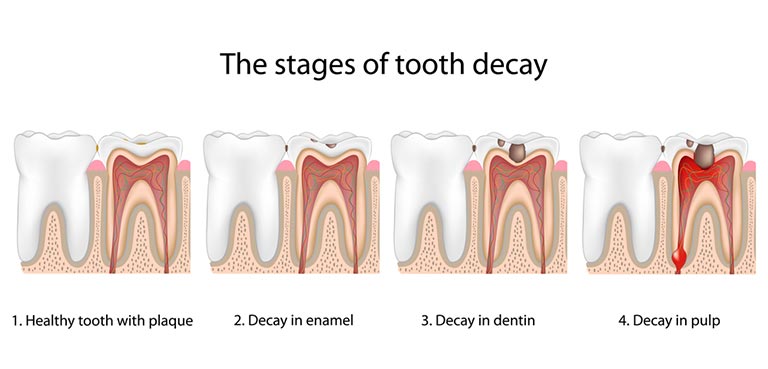Cavities
Dental cavities are formed when bacteria penetrate your teeth and create a hole in your teeth. Most cavities start off when you fail to clean your teeth properly, causing food particles to attach to your teeth. These attached food particles are known as plaque and tartar. Plaque and tartar harbor harmful oral bacteria. These bacteria process sugars in your diet to create acidic byproducts. This acid dissolves and creates a hole in your teeth, which is what we commonly refer to as cavities.
What should I do if I have a cavity?

Once a tooth develops a cavity it needs to be treated by your dentist. Cavities are holes filled with bacteria and they don’t just go away by themselves. You must see your dentist to remove these bacteria and fill the hole with an appropriate restoration.
What happens if I don’t fix my cavity?

As mentioned above, cavities are irreversible and they don’t disappear on their own. If left untreated, cavities get larger and larger as the bacteria destroy more of your tooth structure. This causes your teeth to become sensitive. If left untreated, the cavity eventually reaches your tooth nerve. This causes severe toothache, infection, and ultimately, can cause you to lose your tooth.
How do you fix dental cavities?
The appropriate treatment for a cavity depends on how large the cavity is. The sooner you fix a cavity, the simpler the solution:
Very small cavities
Very small cavities may be reversible. This only applies to superficial cavities where the bacteria haven’t had a chance to poke a hole in your tooth. You may be able to reverse very small cavities with Fluoride application or other topical treatments. Alternatively, our dentist may apply a sealant to close the gap where bacteria are trapped. Be sure to improve your oral hygiene and diet to prevent these small cavities from recurring.
Small-to-medium sized cavities
You can fix most small-to-medium sized cavities with a simple filling. Dental fillings include white fillings, silver fillings (Amalgam), and gold fillings. Your dentist will remove the cavity bugs and fills in the hole with filling material. Fillings eliminate bacteria from your teeth and replace them with a sterile and neutral filling material. This way, you no longer have to worry about the cavity getting larger and hitting your tooth nerve.
Large cavities
Fillings work great for fixing small-to-medium sized cavities, but they don’t work as well for fixing large cavities. Large fillings tend to break, leak, and trap bacteria. Plus, your teeth may develop sensitivity and are at risk of fracturing. Instead, you require a crown, inlay, or onlay to fix large cavities. Crowns, inlays and inlays are made from porcelain or ceramic, which is much more durable than fillings. They protect your teeth from cavities as well as bite pressures to protect your tooth for many years to come.
Cavities that reach the nerve
You can fix your teeth with a filling or crown up until the point that the cavity has reached the tooth nerve. When your cavity reaches the tooth nerve your tooth is now infected. A filling or crown is not going to save infected teeth. Instead, you need a root canal treatment to save infected teeth. Root canal treatment removes the infected tooth nerve, disinfects your tooth, and allows you to save your tooth.
Massive cavities
Cavities continue growing as long as they are left untreated. Eventually, they cause your teeth to become weak and start breaking off in your mouth. You must remove these broken teeth from your mouth as soon as possible. The infection can spread from your broken teeth to other teeth, your gums, and the rest of your body through the bloodstream. There have been documented cases of heart infections, brain infections, even deaths, which resulted from an infected tooth. Leaving broken pieces of teeth in your mouth means the source of infection remains in your mouth. This is very harmful to your oral health and overall well-being.
What is the process of fixing cavities?

The first step to fixing your cavities is to see a dentist. Your dentist will use X-rays to determine how many cavities you have and how large your cavities are. Next, you need to come up with a plan to fix your cavities. You may require fillings, onlays, crowns, root canals, dental implants, or a combination thereof. If you have lots of cavities, or cavities that have caused extensive damage to your teeth, you may require extensive dental work. Come up with a plan and start fixing your mouth before it gets worse.
How do I fix my cavities if I’m scared of seeing the dentist?

You may be overwhelmed thinking about how much time and money it will take to fix your cavities. However, waiting to fix your cavities only makes matters more complicated. A filling today becomes a crown tomorrow and a root canal the next day. The sooner you fix your cavities, the less time and money you have to invest. Find a dentist that you like and come up with a plan to fix your teeth one or two at a time.
If you’re extremely scared of seeing the dentist, consult with your dentist about sedation options. Options. Many dentists offer sedation options like Nitrous Oxide, oral sedation, or even IV sedation, to get you through stressful dental procedures. Sedation can help you concur your fears of the dentist and help you get your cavities fixed. Plus, your dentist can work on multiple teeth during a single sedation appointment. If you’re currently looking for a dentist near you, feel free to use our dentist Search Engine to find one near you. You can browse through dentist profiles, read reviews, view their treatment photos, even book your appointment conveniently online:
0 Comments